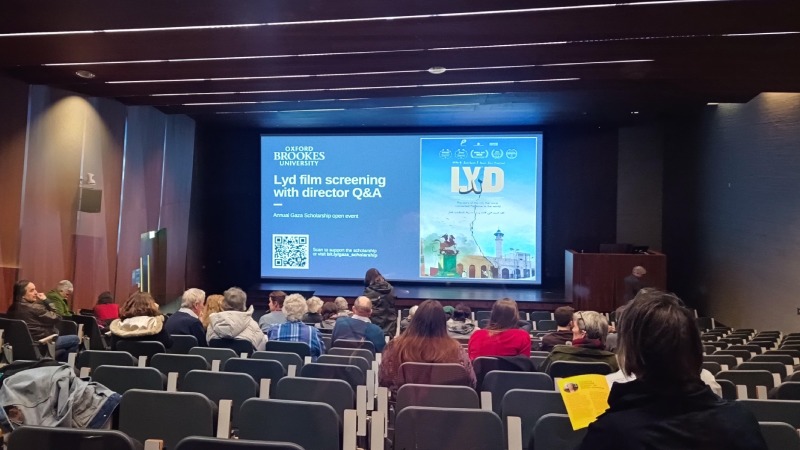Oxford Brookes University hosts screening of 'Lyd,' exploring Palestinian history and identity

On 19 March 2025, Oxford Brookes University held a screening of the film "Lyd," a thought-provoking exploration of Palestinian history and identity, as part of the 2025 Oxford Human Rights Festival.
This annual Gaza Scholarship event featured a post-screening Q&A session with the directors, providing attendees with a deeper understanding of the film's creation and its engagement with complex socio-political issues.
This film is a collaboration between two filmmakers with distinct backgrounds and perspectives, each bringing a unique lens to the project. Sarah Ema Friedland is a Jewish-American filmmaker, media artist, and educator based in New York City. Rami Younis is a Palestinian filmmaker, journalist, and writer based in Haifa, Israel. His perspective is rooted in his experience as a Palestinian citizen of Israel.
A unique cinematic approach
"Lyd" delves into the multi-layered story of the city of Lyd, employing a distinctive blend of documentary and science fiction techniques to examine its past, present, and potential futures. The film addresses themes of displacement, the search for identity, and the power of imagination in the context of historical trauma.
Filmmaker Rami Younis described the evolution of the film's style: "For the first couple of years, we were making a straightforward documentary, basically another film about the Nakba. Unfortunately, there are many stories about what happened in 1948, maybe not necessarily the story of Lyd. Maybe that story hasn't been told enough. But you know, other stories about what happened in 1948 had been told, and we realised that we were making another film that tells yet another horrifying story of another massacre. I think both of us wanted to challenge ourselves. And you know, being fans of science fiction, I think the road from there to deciding we're not going to have a straightforward film, but we're going to incorporate other elements from other genres, became short."
The city as a protagonist
A notable aspect of "Lyd" is its portrayal of the city itself as a character, providing a narrative framework that embodies the Palestinian experience and the collective memory of historical traumas.
Rami Younis explained this creative decision: "The city has a voice, which at first, came as a necessity, because you know, the whole structure of the film, and the form of the film is very complex, and we needed something to tie everything together. We came up with the idea of having the city as a narrative spine. But when we started looking into the story of the city itself, because we wanted to build her as a character, we started humanising the city. And yeah, this is how we ended up with the city as an additional character in the film, and in my eyes, the true protagonist, the hero of the film."
Navigating identity and erasure
The post-screening discussion also explored the complexities of Palestinian identity, particularly for Palestinian citizens of Israel. Younis highlighted the challenges of navigating an education system that often marginalises Palestinian history and the ongoing struggle for recognition and equality.
Rami Younis: "Identity is a problem. I would say that Palestinian citizens of Israel definitely experience an identity crisis. To understand this, imagine being educated in the Israeli public school system. While we, as Palestinian citizens, obviously speak Arabic and are taught Hebrew from a young age, Israeli students in Hebrew-speaking schools don't learn Arabic. More importantly, both Palestinian and Israeli students are taught nothing about the true history of the region before 1948; instead, we are given a history of the Jewish people from a Zionist perspective. Because of this, kids grow up without really knowing their heritage or the history of the place they come from."
The power of storytelling
Both filmmakers emphasised the importance of storytelling as a means of preserving the narratives of Nakba survivors and ensuring that their experiences are acknowledged and remembered.
Filmmaker Sarah Ema Friedland stated, "I think for me, one of the things that I feel most proud of in this film is collecting those stories of people who survived the Nakba, because obviously they are aging. And I think it's really important for their stories to continue to be heard after they're gone. And so I feel like we, with this film and also with some of the footage that didn't make it into the film, have added to that archive of stories of Nakba survivors."
A call for dialogue and understanding
The event concluded with reflections on the necessity of empathy, collaboration, and the vital role of higher education in fostering critical dialogue and understanding of complex social and political issues. The importance of creating spaces for difficult conversations was underscored by an audience member who thanked the University “for allowing us to share, because that is again, the role of higher education—to be able to get together, and share some of these complex questions.”
The collaboration between Younis and Friedland was also cited as an example of how cross-cultural work can produce powerful art that promotes understanding and offers a message of hope. "This gift of your humanity, in how you are committed to tell the story and to share a really difficult reality […] gives us so much hope and inspiration."
The screening of "Lyd" and the ensuing discussion provided a platform for exploring contemporary challenges. Oxford Brookes University is committed to ensuring an environment in which we celebrate, value, and respect each other, particularly in difficult times such as these.
The Oxford Brookes Gaza Scholarship
The Oxford Brookes Gaza Scholarship was created to help young Gazans make their mark on the world. This scholarship funds students to study for a one-year Master’s degree at Oxford Brookes University.
